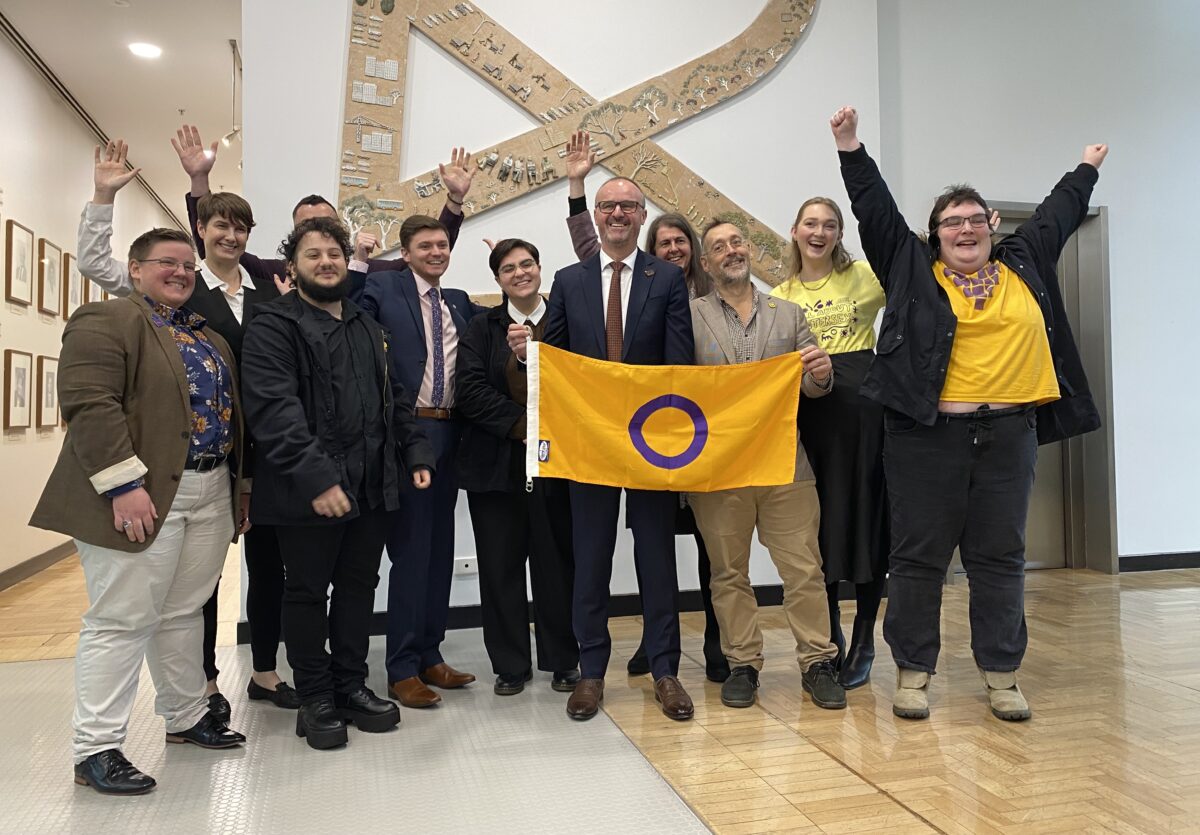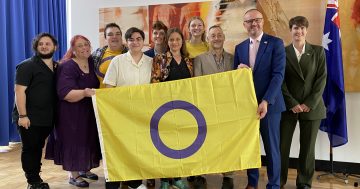
The joy was infectious as a bill protecting the human rights of intersex people and consent about their bodies was passed into law. Photo: Claire Fenwicke.
Intersex people will no longer be subjected to irreversible medical procedures without their consent, thanks to a new nation-leading law passed in the ACT Legislative Assembly.
The Variations in Sex Characteristics (Restricted Medical Treatment) Bill 2023, which was first introduced to the Legislative Assembly three months ago, represents the first time the right of intersex people to make their own decisions about non-essential medical treatments on their bodies has been enshrined in law.
For Canberra-based intersex educator and activist Cody Smith, this has been a long time coming.
“There’s no rewriting my story. There’s no changing what’s happened to me. But what we get to do is change the narrative for the next generation of intersex children,” they said.
“That has always been the goal. That’s always been the fire that’s gotten me out of bed every day, and to finally realise it on a day like today is indescribable.”
They said this legislation would be game-changing for intersex children and young people because it would create conversations and support for families until the intersex person was able to make an irreversible decision about their body for themselves.
“[This legislation] would have given me words to understand what was happening to me. It would have given me a voice to advocate for myself in the doctor’s office. It would have empowered me to make different decisions about my body. It wasn’t right to have those decisions taken away from me,” Cody said.
“Ultimately, what needs to happen is that every intersex person, whether they’re in favour of surgery, whether they’re against surgery or other medical interventions, that they are the ones in control of their own destiny because that’s been denied to so many of us.”
Intersex advocate Mimi Hall and her parents have also been vocal about their intersex journey and feeling like they didn’t have an informed choice at the time.
Mimi said she felt her parents would have wanted legislation such as this to help and support them through the decision-making process when she was a child.
“It’s so understandable how confronting it is and how scary it is to find out your child is intersex in a world which doesn’t talk about intersex issues and where the medical community dumps information without actually providing the psychosocial support,” she said.
“I think this legislation will help give all that information, but also give power less to the decision makers when that child is born and more to the child themselves, and give the resources that those children need.”
She acknowledged that while this was an incredibly exciting day for the intersex community, the feelings were also complicated.
“Obviously, it comes with a lot of sadness for the things that have happened for the intersex community, and it is a day that has taken way too long to come, but it is also a day that is here,” Mimi said.
“Lots of intersex people are so happy about this legislation and so relieved that this has passed. It’s just such an exciting day.”
The bill received tri-partisan support when it was passed through the Assembly.
Chief Minister Andrew Barr said while it had taken years to get to this point, it was expected to take about 18 months for the full effects of the legislation to come into place.
“There’s a lot of training that’s going to be necessary ahead of the bill, and elements of the bill, commencing,” he said.
“It’s not something that’s going to happen overnight. It’s taken years to get to this point and there’s a little bit to go in this journey.”
Some amendments were put forward by the Canberra Liberals, mainly around parents and enshrining their voice into the legislation. One also made sure parents or caregivers were offered the same support as the intersex young person.
Mr Barr said while they were well-meaning, they would have fundamentally changed the nature of the legislation.
However, one amendment was agreed to – ensuring the wellbeing of the individual was protected along with their rights.
“The best time to have done this legislation was years ago, the next best time is now, and it’s great that the ACT is the first, and we look forward to the other states and territories following.”
Along with the legislation, a Variation in Sex Characteristics Psychosocial Support Unit is being set up at the Canberra Hospital with specialist staff to support intersex people and their families and training packages and resources to support health professionals providing these services.
Intersex advocates have also voiced their hopes similar legislation will be adopted nationwide.
Equality Australia CEO Anna Brown said the ACT’s reform was “ground-breaking” in delivering safety and protection both to intersex young people and clinicians.
“We know there are intersex young people and children today being subjected to these surgeries. This has to stop, and the only way to stop this from happening is to ensure that we have legal protections, criminal sanctions and really robust schemes to protect young people,” she said.
While Intersex Human Rights Australia executive director Morgan Carpenter reminded people that unnecessary and irreversible surgeries had been performed on intersex people without their consent for decades, regulation was needed to create a better understanding of what was still happening.
“Medical clinicians will be asked to document what they’re doing, even in relation to treatments that are permitted, that are exempt and that are urgent, and I think that is going to give us all a better understanding of what’s happening,” he said.
“This legislation is a chance to break that cycle, to transform the situation, to provide better regulation from the get-go and make sure that children only receive the care that’s appropriate for them and they can make their own decisions to the maximum extent possible about what they want for the future.”













